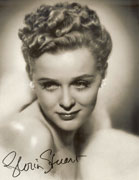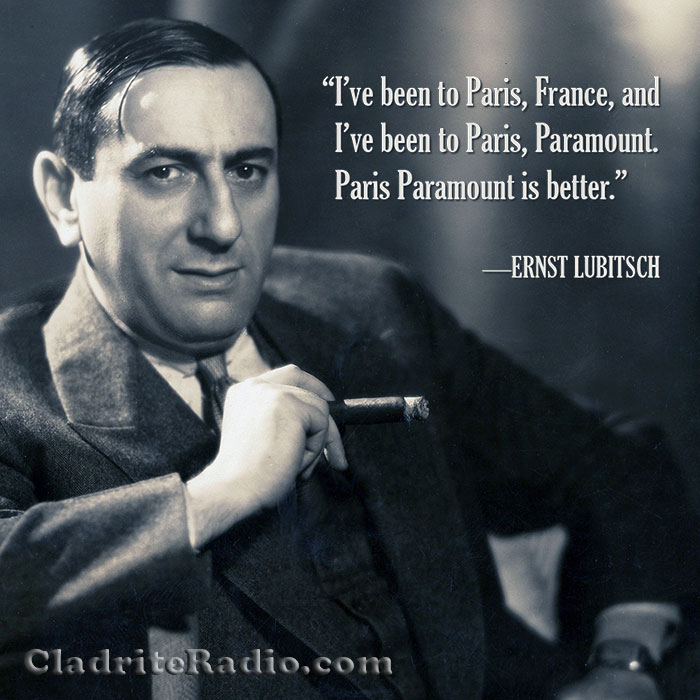Here are 10 things you should know about director Ernst Lubitsch, born 131 years ago today. The “Lubitsch Touch” was not just hype; he was a true giant of cinema.
Tag: The Shop Around the Corner
10 Things You Should Know About Joseph Schildkraut
Here are 10 things you should know about Joseph Schildkraut, born 126 years ago today. After beginning his career in Europe, he enjoyed success on stage, in films and on television in the U.S.
10 Things You Should Know About Felix Bressart
Here are 10 things you should know about Felix Bressart, born 127 years ago today. After two decades of appearing on stage and screen in Germany and Austria, he made 35 films in 10 years in Hollywood.
Remembering Gloria Stuart on Her Birthday
Gloria Stuart was born on Independence Day, 1910, in Santa Monica, California. In 1999, when she was just a kid of 89, we got to interview her on the occasion of the publication of her memoir, I Just Kept Hoping. The interview was conducted over the telephone, though we did get the chance to meet Ms. Stuart when she came to NYC for her book party.

We considered it quite a thrill, we don’t mind telling you, to get to interact with Ms. Stuart. After all, this is the women who starred opposite Claude Rains in James Whale‘s The Invisible Man, who appeared with Boris Karloff, Melvyn Douglas, and Charles Laughton in The Old Dark House, who worked with greats such as Irene Dunne, Ralph Bellamy, Pat O’Brien, Lionel Barrymore, Lee Tracy, Nancy Carroll, Frank Morgan, Paul Lukas, Edward Arnold, Eddie Cantor, Ruth Etting, and dozens more.
So, to celebrate her 111th birthday, we thought we’d share the interview we did with her in 1999. Enjoy!
It’s been a long, eventful life for former and current movie star Gloria Stuart. She had her first go-around at stardom in the Hollywood heyday of the 1930s and ’40s; then, after taking off 30 years or so to pursue painting, travel, and political activism, she again began to act in the 1970s, eventually garnering a Best Supporting Actress nomination for her role in Titanic. Still going strong today at the age of 89, Stuart has now added authorship to her list of achievements. Her candid memoir, I Just Kept Hoping, is peppered with anecdotes about such memorable figures as Shirley Temple, Groucho Marx, Dorothy Parker, and J. Robert Oppenheimer, the father of the atomic bomb. We spoke to Gloria about her life, her two careers in the movies, and her secrets for living so long and so well.
An Interview with Gloria Stuart
You made three films with director James Whale: The Invisible Man, The Old Dark House, and The Kiss Before the Mirror. What can you tell us about him?
I’m very happy I was in those films. You know, James is a cult figure in England. There are a lot of James Whale fan clubs. Actually, right after I had read for Jim Cameron for Titanic, I had booked a month in London. I went right away, and there were two wonderful James Whale organizations that I met with. He’s getting his due now, thanks to Gods and Monsters.
What did you think of Gods and Monsters? Was it, in your view, an accurate portrayal of Whale?
Oh, yes, it was. Ian McKellan captured James’s elegance, the beautiful manners, the beautiful tailoring, the precision, the whole thing. Of course, no one could be James, but he came awfully close.
The special effects in The Invisible Man hold up remarkably well today for a film that was made in 1933.
Yes, people who see it today—it runs every so often—they say, gee, it’s not an old hat movie at all.
I’m wondering—did the processes that went into creating those special effects slow down the pace of moviemaking at all?
It was never evident. Only James and the cameraman and I guess all the process people at Universal—the rest of us never had any inkling of what was going on. We did do a lot of shooting in front of black curtains. Now, I wasn’t on the set when the bandages came off or anything like that, so I have no idea about that. But it was very, very secret. I wasn’t on the set when they were finagling the bandages off, and so forth.
That would’ve been fun to see.
Yes, it would’ve! Claude [Rains] may have known [how it all worked] but he never said so.
You and your second husband, Arthur Sheekman, were good friends with Humphrey Bogart and Mayo Methot, his wife at the time. What can you tell us about Bogie that we might not know?
Read More »
Happy 125th birthday, Ernst Lubitsch!
The great—and we do mean great—Ernst Lubitsch was born 125 years ago today in Berlin, Germany. He would go on to direct some of the greatest comedies in cinema history. Here are 10 EL Did-You-Knows:
Lubitsch’s parents were Ashkenazi Jews; his father was a tailor who hoped that his son would follow in his footsteps, but Ernst was interested in the theatre.
Lubitsch began his career as an actor, making his film debut in 1913 in The Ideal Wife. He directed his first picture in 1914. He would go on to act in approximately thirty films before making the switch to directing fulltime in 1920.
In 1922, Lubitsch was hired as a director by Mary Pickford and came to Hollywood. He and Pickford didn’t get along while they made their first and only picture, Rosita, together, but he was quickly offered a six-picture deal by Warner Brothers that gave him his choice of cast and crew and final edit privileges.
Lubitsch’s reputation for creating sophisticated comedies began in the silent era, but it was with the rise of talking pictures that he really found his stride. Many of his early sound pictures—The Love Parade (1929), Monte Carlo (1930) and The Smiling Lieutenant (1931) among them—were musicals that certainly featured elements of the stylish comedic work he would come to be associated with, but it was with his 1932 masterpiece, Trouble in Paradise (1932), that he made his first big splash in the genre of romantic comedy. He would make no more dramas after Broken Lullaby (1932).
After several years with Paramount Pictures, Lubitsch was named the studio’s production manager, making him the first director to run a major studio.
In 1939, Lubitsch moved to MGM, where he directed Ninotchka. Though he was longtime friends with the picture’s star, Greta Garbo, Ninotchka was the first and last time the pair would work together.
Billy Wilder cited Lubitsch as his favorite director. He is said to have had a sign over the door in his office that read, “How Would Lubitsch Do It?”
The Lubitsch classic The Shop Around the Corner (1940) was remade twice: In 1949 as a musical (In the Good Old Summertime, starring Van Johnson and Judy Garland) and in 1988 as a romantic comedy (You’ve Got Mail, starring Tom Hanks and Meg Ryan). The 1963 Broadway musical She Loves Me was also based on the film’s source material, the play Parfumerie by Hungarian playwright Miklós László.
Lubitsch’s unique blend of wit and sophistication came to be known in Hollywood and around the world as “the Lubitsch Touch,” a label which critic Michael Wilmington ably described: “At once elegant and ribald, sophisticated and earthy, urbane and bemused, frivolous yet profound. [Lubitsch’s pictures] were directed by a man who was amused by sex rather than frightened of it—and who taught a whole culture to be amused by it as well.” We couldn’t agree more.
In 1946, Ernst Lubitsch received an honorary Academy Award for his distinguished contributions to the art of the motion picture. He died of a heart attack the next year.
Happy birthday, Ernst Lubitsch, wherever you may be!

